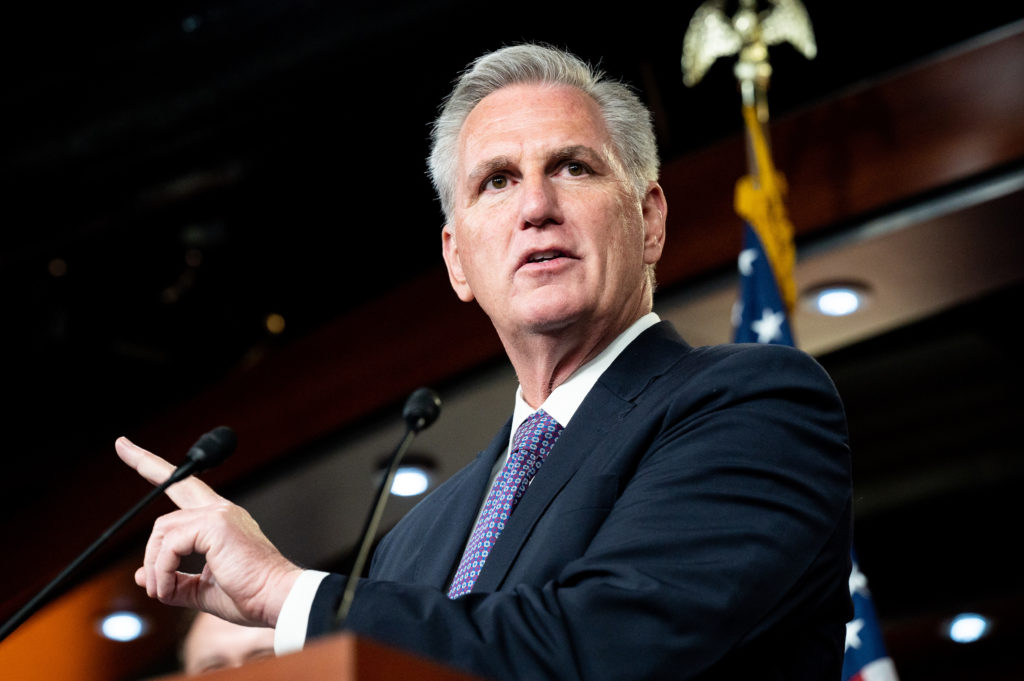
Like a line of thunderstorms, political disturbances travel in clusters. And in these years of wild congressional weather, we now have an approaching once-in-a-century phenomenon: a possible deadlock over who will be the speaker of the House.
This could get complicated.
Here’s a brief rundown on what can happen today (and maybe later this week).
What happens exactly? And when? At 12 p.m. EST the House is called to order. There is some opening business (a prayer, the Pledge of Allegiance) and then, essentially, taking attendance. Members must record their presence using voting cards. Somehow this simple act takes at least 30 minutes. But it is fun to watch. Some members will have their children with them, others may try to twist arms for speaker.
Watch the House speaker vote in the player above.
There is a little more housekeeping from the clerk and then around 12:30 or 12:45 p.m., the election for speaker is expected to begin.
How does the speaker election work? In alphabetical order, each member announces their choice for speaker. This also takes some time — about 90 minutes to two hours.
How many votes does one need to be House speaker? The simple answer is: a majority. But the more complete answer is that you need the majority of the people who voted for a specific person. Anyone voting “present” does not count toward that tally.
If every member votes for a candidate for speaker, the winner would need at least 218 votes.
What is the math like for Republican leader Kevin McCarthy? McCarthy is the GOP nominee for speaker, chosen by a majority of his conference. He has long wanted to become speaker.
Republicans have 222 seats in the new House.
But there are at least 14 Republicans who say either that they will definitely vote against him or that they cannot yet get on board. McCarthy needs nearly all of them (all but four) in order to clinch the speakership.
What happens if no one gets 218 votes? The House votes again. And again. And again. Until someone gets to 218.
Educate your inbox
Subscribe to Here’s the Deal, our politics newsletter for analysis you won’t find anywhere else.
Has that ever happened before? Yes — 14 times, according to the House historian. But only one of those has been since the Civil War, in 1923.
What business can the House do without a speaker? Nearly nothing as a group. The next two items of business — the swearing in of the members and the passage of the rules of the House — would both go on hold.
Wait. The House will have no rules until after the speaker is elected? Basically. Each House of Representatives starts with a clean slate, no rules of operation. (The Senate is different; its rules convey between sessions.) After the speaker of the House is elected, they oversee the adoption of the rules.
So without a speaker, there also are no House rules. There is just the House clerk, who stands at the lectern trying to keep the peace.
So then how does the House operate? Without formal passage of rules, the House operates off some previous rules but mostly by tradition and precedent.
I have a wild idea. If there are no rules, couldn’t the rules for electing the speaker be changed? That is not as preposterous a scheme as you may think. Some in Congress now are considering whether they could get the chamber to agree that only a plurality is needed to elect the speaker.
This could actually come into play, but it is a long shot. In the past, the House clerk has ruled against attempts to make end runs around the speaker’s election.
How long could all this take? It could take hours, if McCarthy is lucky and wins quickly. Or it could take days, especially if other significant candidates emerge.
One last oddball question: What happens to the line of presidential succession if there is no speaker? An interesting thought. And something untested by history. The presidential line of succession is: vice president, speaker, Senate president pro tem. We will make a guess that if there is no speaker, then the Senate president pro tem would temporarily be second in line to the presidency.
A note: That will now be Sen. Patty Murray, D-Wash., the first woman to occupy the position.
Things can change with little warning. For the latest and greatest, you can follow my updates on Twitter.
More on politics from our coverage:
- Watch: The new House of Representatives gavels in at 12 p.m. EST. The vote for House speaker is expected to begin shortly after.
- One Big Question: Why are some House Republicans holding out on McCarthy’s speaker bid?
- A Closer Look: A look at the big issues that inspired new state laws taking effect in 2023.
- Perspectives: New York Times columnist David Brooks and Washington Post associate editor Jonathan Capehart on the year in politics and what’s ahead in 2023.
ncG1vNJzZmivp6x7sa7SZ6arn1%2Bjsri%2Fx6isq2egpLmqwMicqmismJp6pb7ApphmnKKew6q6xmaroZ1dnby2v8RmqqmdkaCys3nVqKue